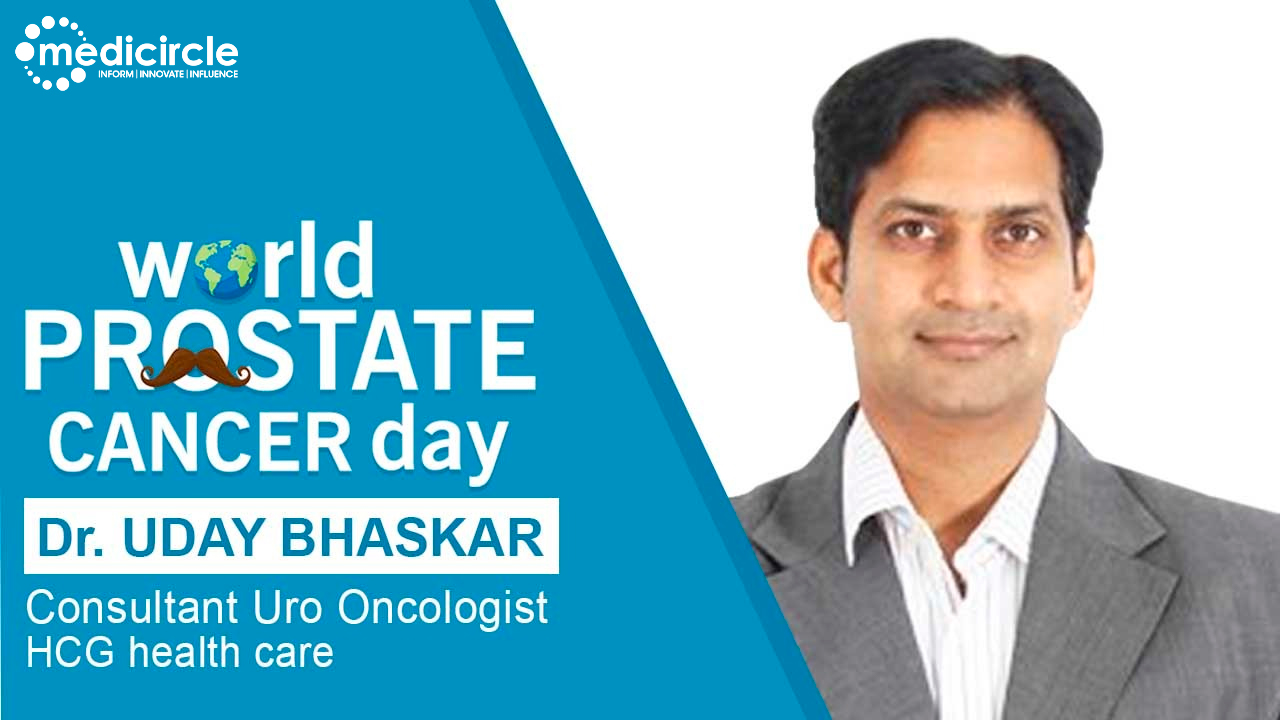Did you know 1 in 8 men are diagnosed with prostate cancer in their lifetime? Prostate cancer is a severe disease for many adult men. It’s the second most common cancer in men worldwide, and the risk of developing it increases in elderly men. The disease starts when cells begin to grow out of control in the prostate gland. The 5-year survival rate for prostate cancer in India is 64%. Old age, obesity, improper diet, and genetic alterations have been identified as some of the main contributing factors towards an increased cause of prostate cancer. Since September is National Prostate Awareness Month, we at Medicircle are conducting the National Prostate Cancer Month Awareness Series to be aware of this problem of prostate cancer which will help you deal with it.
Dr. Uday Bhaskar is working at HCG Healthcare as a Consultant uro oncologist, Robotic and renal transplant surgeon. He has performed more than 150 robotic surgeries, like radical prostatectomy, radical cystectomy, and partial nephrectomy. He is expertise in endourology, uro gynaecology, Laparoscopic, Robotic and open urology, both benign and oncology.
Prostate cancer is genetic
Dr. Uday explains, "Prostate cancer has a genetic basis. So, if your father or your uncle is having prostate cancer, the risk increases one-fold. And if your brother or siblings are having prostate cancer, the risk doubles. Whenever there is such a risk factor in the family, it is always advisable to get a screening test done at the age of 45 or 50 years where the doctor checks PSA level (Prostate-specific antigen). If it is high, it means there is a risk of prostate cancer. Early detection is always equivalent to complete cure of the disease.”
PSA (Prostate-specific antigen)
Dr. Uday, "Normal PSA level is 4 ng/ml. If it increases above this, then there may be a risk of prostate cancer. There are other reasons also which can be a cause for the rise in PSA level – infection in the prostate, urinary infection when we can't pass urine. In any case, if it increases above the normal level, you can seek a Urologist's advice. This will help in the early pick up of disease and can determine the stage and its suitable treatment. The PSA level can't be controlled like blood sugar, cholesterol level. So, its early detection is very important.”
Benign Prostatic Hyperplasia (BPH)
Dr. Uday mentions, “Increase frequency of urine is a natural process of prostate enlargement which is called BPH (Benign Prostatic Hyperplasia). The prostate gland is located near the urinary passage and its main function is to produce nutrients that take care of sperm in semen and to add volume to the semen. Because of the hormonal changes and aging process, the prostate keeps on growing in size and this obstructs urinary passage which in turn causes incomplete emptying, slow stream, and pain while passing urine. Generally, more urine is produced in the nighttime as compared to daytime. So, while sleeping if you are unable to complete emptying, you get a sense of incomplete emptying and need to pass urine many times. It is one of the signs of prostate enlargement.”
Ways to prevent
Don't take much fluid after 7 or 8 pm. Avoid tea or coffee in the evening. Avoid smoking and alcohol. Try to manage weight and avoid obesity.
Dr. Uday adds, “Patients with signs and symptoms can consult Urologist, should get your PSA test done, get an ultrasound done so that doctor can assess the size of the prostate. This will help in distinguishing between cancerous or non-cancerous prostate.”
Sexual health is important for your prostate health
Dr. Uday stresses, “We cannot stop cancer but we can cure it by diagnosing it at an early stage. 100% cure is possible if you detect early. In some of the studies, it is revealed that if you ejaculate or perform sexual intercourse more than 21 times a month, this cuts down the risk of prostate cancer. So, your sexual health is also very important for your prostate health.
Your sexual health is going to be healthy only if you are overall healthy. You need to have healthy livings, healthy habits, regular exercise, maintain proper body weight, optimum blood sugar level, normal BP level so that sexual health is not affected which in turn will not affect your prostate health.”
(Edited by Renu Gupta)

 “Prostate cancer has a genetic basis. We cannot stop prostate cancer but we can cure it by diagnosing it at an early stage. Early detection is always equivalent to a complete cure of the disease. Sexual health is also very important for your prostate health,†Dr. Uday Bhaskar, Consultant Uro oncologist, HCG Healthcare
“Prostate cancer has a genetic basis. We cannot stop prostate cancer but we can cure it by diagnosing it at an early stage. Early detection is always equivalent to a complete cure of the disease. Sexual health is also very important for your prostate health,†Dr. Uday Bhaskar, Consultant Uro oncologist, HCG Healthcare









.jpeg)

















.jpg)


